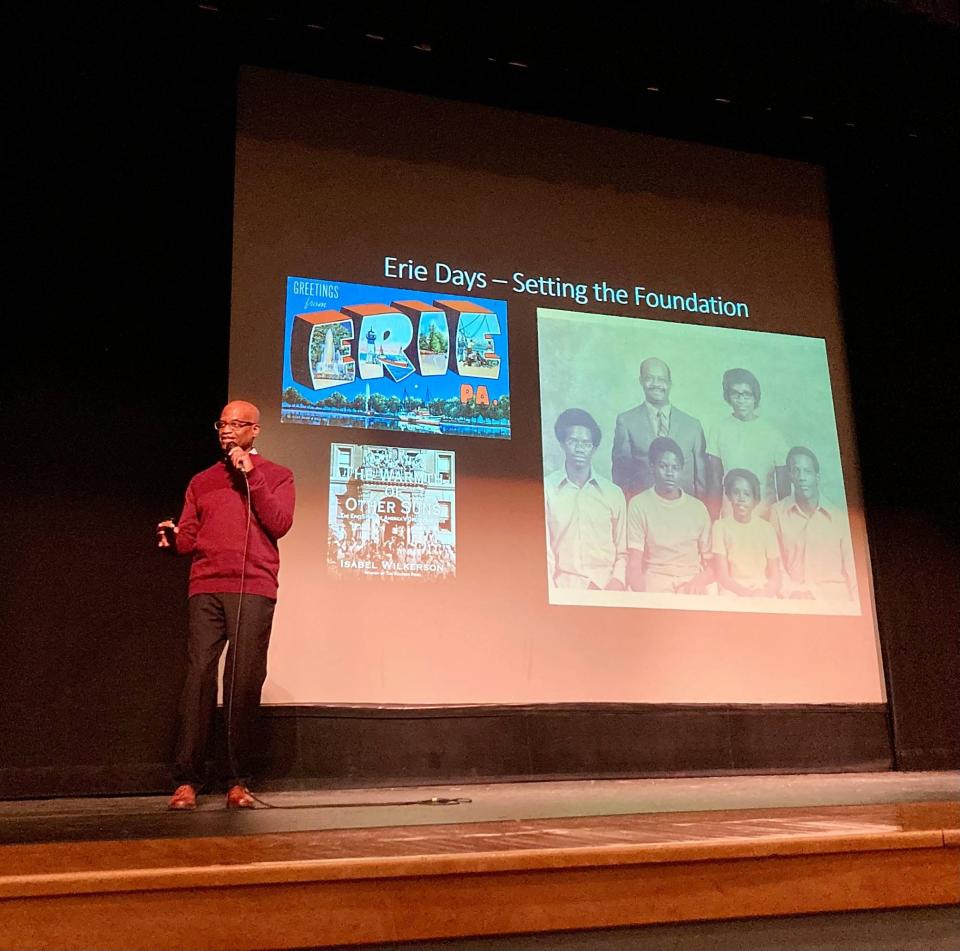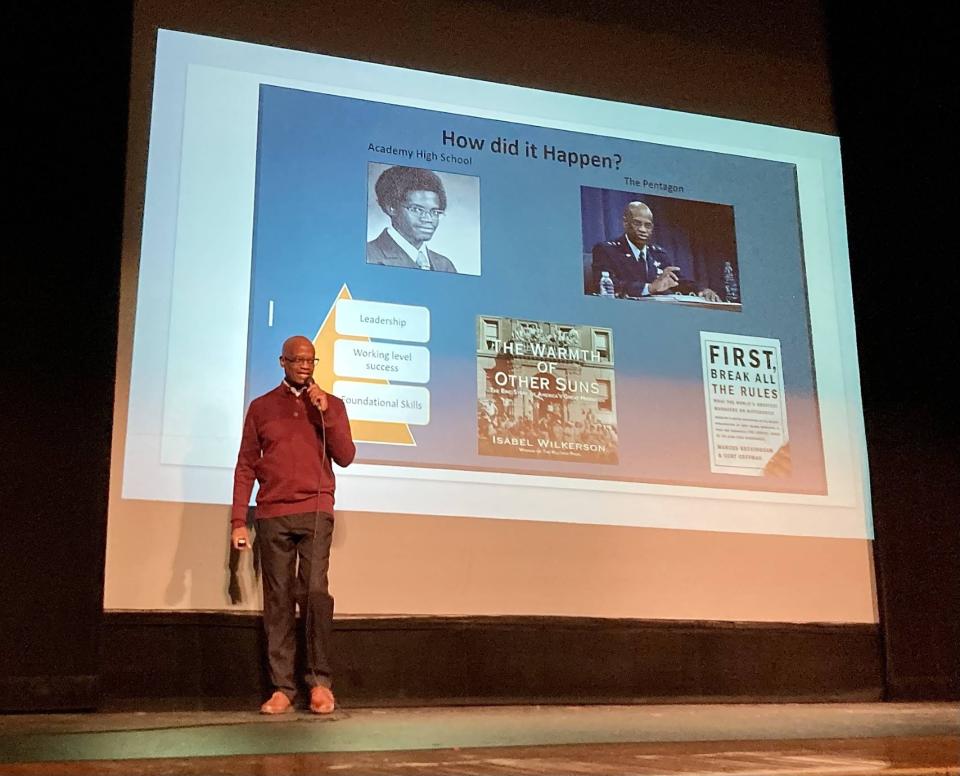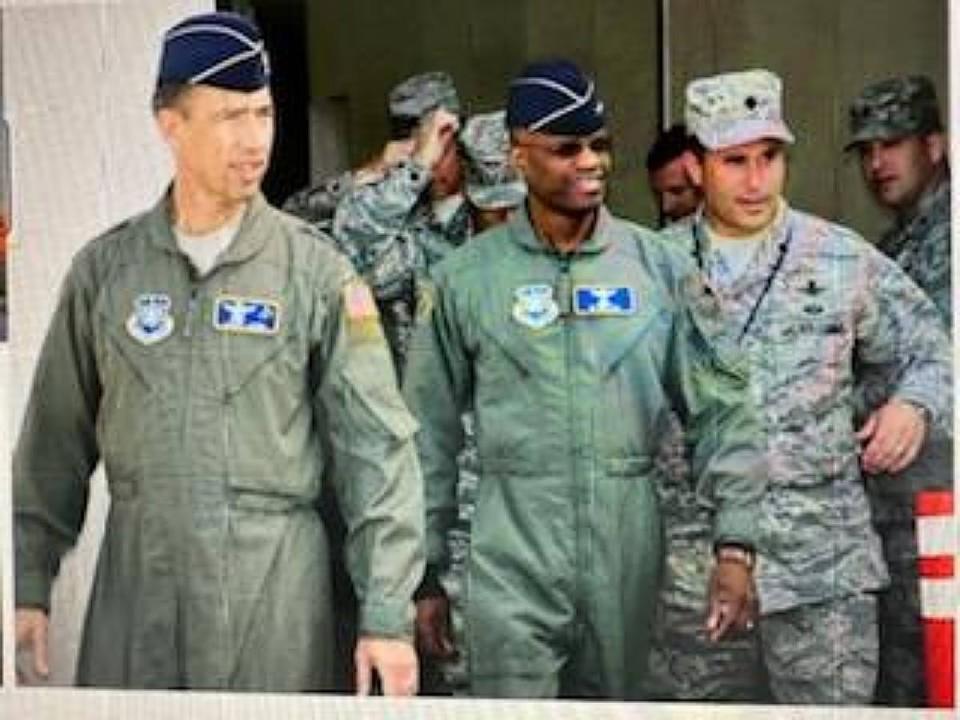A son of Erie - Maj. Gen. Bolton, who served in White House, shares keys to his success
- Oops!Something went wrong.Please try again later.
- Oops!Something went wrong.Please try again later.
Retired Air Force Maj. Gen. Edward L. Bolton Jr., an Erie native, was honored as the recipient of the Jefferson Educational Society's Thomas B. Hagen Dignitas Award on Nov. 10 during the Global Summit XV. This guest column is adapted from remarks he made to students at Northwest Pennsylvania Collegiate Academy in Erie on Nov. 10. Bolton is a 1972 graduate of the school, which was known at that time as Academy High School.
From the beginning
I'm writing this column to share how I, Ed Bolton, the son of a working-class family from Erie, completed three college degrees, worked in the White House, and became a two-star general in the United States Air Force. I accomplished these things even though when I lived in Erie, l was told, "No one from Erie ever amounted to anything." Yes, that's what we were all told. And yes, they were wrong. If you have ever been underestimated or disrespected, overlooked or underrated, then my story may be of interest to you.

Erie days – setting the foundation for success
On Feb. 7, 2007, my parents, Eddie and Louise Bolton, pinned the stars of an Air Force Brigadier General on my uniform. Dad was born in Largo, Mississippi, 101 years ago last month. A polio survivor, his first job was in the cotton fields. So, literally, hands that picked cotton in rural Mississippi in the 1930s pinned stars on his son's shoulders. A son he raised in Erie. How did this happen? Well, all the successes I have had are the results of the foundational skills I learned in Erie.
As told in Isabel Wilkerson's book "The Warmth of Other Suns," in the 1940s and 1950s factories in the northern states started to hire African Americans. Dad came to Erie to work at the local General Electric plant. My mother came north because she had family here. My parents met at Second Baptist Church. Born in 1954, I was the firstborn "Bolton kid." The Bolton kids were a talented group. I was always asked, "Which one are you? Are you the gifted violinist and pianist?" I'd say, "No, that was Karen." "Were you the varsity wrestler who was also on the basketball team?" I'd say, "Nope, that was Rodney." "Were you the one that played four instruments, and was a star on the tennis team?" "No, that was Deryl." I was the "also-ran" Bolton child.
Not surprisingly, I was an indifferent student. But I had two things going for me: My mother and my father. Among the greatest blessings I've received was the fact that I was raised in a two-parent family. My father was the hardest working person I've ever met. I have met impressive people from every part of society, but I have never met anyone who worked harder than my father. My mother believed in the power of setting and pursuing goals. It was her idea to move us from East 18th and Wallace streets to East 32nd and Brandes streets, a 2-mile move that put us in a safer neighborhood with better schools — and she and Dad made it happen. So, my father's strong work ethic and my mother's focused goal setting are foundational skills that I absorbed and often relied on later in life.
I also picked up a few other positive attributes. I was very independent. Starting when I was 9 years old, my brother and I, every Saturday, took the bus to the YMCA where we hung out all day. No parent today would send their kids across town for an all-day outing without supervision. But in those days, we learned to set priorities and make decisions on our own. Another reason I learned to solve my own problems is because I was old enough to understand some of the financial hardships my family was experiencing, and I didn't want to put any more pressure on my father's shoulders than he already had. I learned early on to figure it out or go without.

In 1962, after we moved, we attended Emmanuel Presbyterian Church. I was on a championship basketball team there and, more importantly, learned a great deal about teamwork and values. In those days, values were those things that drove you to make yourself a better person and perhaps even inspire others to follow the example you set. I also became a Boy Scout. The Scouts provided another venue to learn teamwork and offered me my first shot at being a leader.
I was a true sci-fi geek. I read constantly. Americans first walked on the moon while I was in high school, and the space race led me to science fiction. My interest in engineering was born during those days.
Despite being a poor student, I graduated from high school and managed to do well enough on the SATs to get into college. Mom said, "You got in; you are going." I went to Edinboro State College. Unfortunately for me, however, in college you had to go to class and do the work to get good grades. Who knew that? Not me! So, my first college experience didn't last very long.
Role models who "looked like me"
How did I become motivated? Well, after my failed attempts at completing college, my mother shipped me off to live with my older half-sister, Jewell, and her husband, Eddie Miles. My focused and determined sister had graduated from high school after skipping two grades, completed college and became a high school French teacher. She'd married Eddie, who was an Air Force captain. I lived with them for some months and while there, I saw something that I needed to see — role models who looked like me. Jewell and Eddie were college-educated, lived in a very nice, well-furnished home, and never seemed stressed about money. When we went to a restaurant, you could order anything you wanted, which was a new experience for me. "We can make a better meal at home." That is what I was used to hearing.
Driven by a goal - I wanted to be an Air Force officer
I wanted that life and in pursuit of that dream I enlisted in the Air Force in 1976. I sailed through basic training and technical training, went to my first assignment, and started to work. My goal was to become an Air Force officer. While enlisted, I worked full time, played on basketball and volleyball teams, and took college courses most evenings. When I met with the base education officer, she asked if I had heard of the Airman Education and Commissioning Program, AECP. She told me, "If you are selected for the AECP, you will be promoted to staff sergeant and your job will be to attend college full time. While in college, you will be paid a full salary and all your college expenses (tuition, books, living expenses) will be covered by the Air Force. And if you complete the program, you will become an officer." I said, "That sounds great! Who do I have to kill to get this?"
She said, "Well, there is a catch. Our strongest need is for engineers, so you must be good at math." I said, "I'm great at math," which was the biggest lie I told in my life. I had to take algebra twice to graduate from high school. But I'd finally figured it out: You go to class. You do the work. You prepare for the tests. That month I started taking college-level math courses — and got good grades.

It took two years of college at night while working full-time during the day for me to become one of only 100 airmen who were selected for AECP fellowships in 1980. Through the AECP, I completed an electrical engineering degree from the University of New Mexico, attended and graduated from officer training school and became an Air Force officer in 1983. Eleven years after I graduated from high school, I accomplished my first major goal. It was a major turning point in my life, and it was the last time that I wasn't in the first group of people promoted to any rank.
After that, every accomplishment seemed easy — and that should give others hope. I wouldn't want to be a teenager right now. It is a very tough time to be young, but you know that. What you may not know is that if you survive the tough teen years, complete high school, get through college, then get in the workforce, it's all downhill from there. Nothing you will face will be harder than what you're facing now. So, hang in there!
More education led to greater successes
As a young officer I focused on becoming the best officer in my peer group. To that end, I eventually received three college degrees and completed three fellowships. My education includes the Defense Systems Management College where I studied program management; USC (a master's in systems management); and the Air Command and Staff College. The Command and Staff College was another turning point in my life because there we studied critical thinking and leadership and I graduated with honors. Later in my career, I also picked up a second master's degree. This one was from the National War College, also with honors. I just kept setting and achieving goals — education, promotions, awards, then more goals. It did involve a lot of work, but my father had worked harder — much harder — for far less.
The White House
I moved up quickly through the ranks and was selected for colonel in 1998 — just 15 years after I graduated from officers training school. By 2000, I was on the White House staff and in the National Security Council during the Clinton administration. Things weren't as partisan then and I was asked to stay on when George Bush became president. I worked for Dr. Condoleezza Rice. Early into the new administration, I pulled together President Bush's first discussion with the most senior military leaders. During the meeting, President Bush left to call Menachem Begin, who had just been reelected president of Israel. When he and Dr. Rice came back to the meeting, she stopped the president in front of me and said, "Mr. President, I'd like you to meet Col. Ed Bolton. He put this discussion together for us. He's also a space guy." President Bush said, "Spaceman, how're you doing? Nice to meet you." President Bush had a nickname for everyone.
Later that evening, we went to a reception in the White House East Room, which overlooks the Rose Garden. It was a beautifully clear and cloudless night, so from the reception you could look out over the Rose Garden and see the Washington Monument in the distance, which was in clear view under a glowing full moon. It was truly a memorable evening for me. I spoke to Dr. Rice and said, "We've never met in person, so I didn't think you knew me. Thank you for introducing me to the president." She responded, "Ed, I haven't met you, but I've read your bio and I've talked to people about you. I look forward to your being part of my team and I know going to do great work for us."
That was a leadership lesson that I will never forget: the number one job of a leader is to make people feel valued. That is why you never hear anything bad about Condoleezza Rice — because her people love her.
My post-Air Force career
After I retired from the Air Force in 2013, I was hired by the Federal Aviation Administration to help turn around their National Aerospace System modernization program — which took about three years. Then I went back into the space business as a senior vice president at the Aerospace Corporation and retired again in 2019, this time for good — or so I thought.
George Floyd was murdered in May 2020. As I watched the many peaceful demonstrations on television, I was reminded of the March on Washington in 1963. In my view, each event presented a once in a generation opportunity for us to make important progress in civil and racial justice. So, when the CEO from my last company asked me to help him improve his diversity, equity and inclusion programs, I agreed. I worked with him, as a consultant for three years. Together we set recruiting, retention and representation goals, not quotas. We evaluated the team's results and their results influenced annual bonuses. I learned that a wonderful way to get people to focus on a goal is to connect the goals and results to their pay. I am proud of our quite positive results.
And then last month I boomeranged back to work. A friend asked me to become the Federal Aviation Administration's chief of staff. Once again, I accepted an opportunity to do some important work.
I’ve often been asked "What are your biggest influences?" I was very strongly influenced by my many years in the Air Force. I was also shaped by the numerous educational opportunities I had, particularly by what I learned in the senior military schools. However, the biggest influences on my life were and are my parents who sacrificed so much to put me on the path that led me to all the successes that came later. To this very day, when I am considering a difficult decision, I think about Eddie and Louise Bolton and ask myself, "Would they be proud?" Then I always know what to do. I don't know how much longer I will work or what I will do next, but you can be confident that it probably will involve setting goals, working hard, being a leader and staying true to the values I first learned from Eddie and Louise Bolton in Erie, Pa.
This article originally appeared on Erie Times-News: Maj. Gen. Bolton of Erie describes path to the White House and beyond

